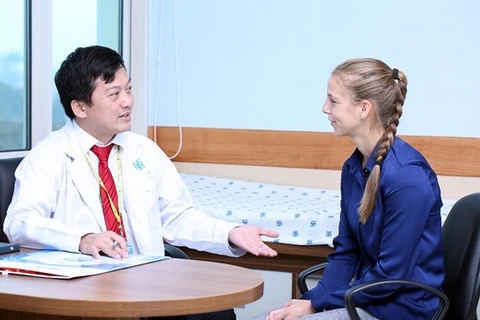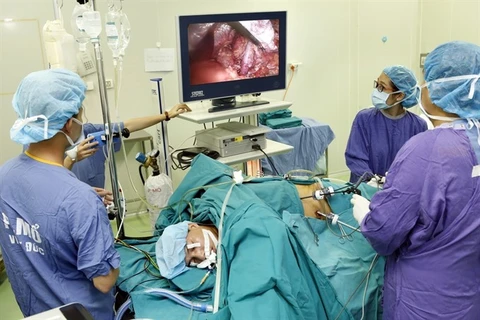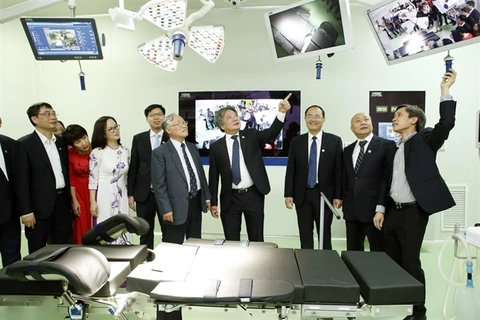Hanoi (VNA) – The US Embassy in Vietnam has sent a letter thanking the doctors, nurses and staff of Viet Duc Hospital in Hanoi for saving a US citizen who suffered a fatal brain injury after a traffic accident.
 Medical staff of Viet Duc Hospital take the US patient to the airport to return home to reunite with his family. (Photo: VietnamPlus)
Medical staff of Viet Duc Hospital take the US patient to the airport to return home to reunite with his family. (Photo: VietnamPlus) “The US Embassy and I would like to thank you for your wonderful care of Justin Martinez during his long stay at Viet Duc Hospital,” US Ambassador to Vietnam Daniel J. Kritenbrink said in the letter.
“Justin was fortunate to have your team taking care of him after such a serious accident. With your help, he was able to return to the US, reunite with his family, and begin receiving the critical rehabilitation care that he needs,” he noted.
On April 20, the hospital’s Intensive Care Unit (ICU) received the patient, who was suffering from severe traumatic brain injury and had to rely on a ventilator to maintain his life after the traffic accident.
On the CT scan, doctors found that the American had a hematoma under the right hemisphere. He was urgently completed all the necessary tests to have an emergency surgery within the day. Neurosurgery specialists performed the surgery to open his skull and remove the hematoma to release the patient's brain.
Dr. Bui Huy Manh, who directly operated the surgery, said an acute subdural hematoma often presents headache, vomiting, nausea, stiff neck, epilepsy, convulsion and coma. If it is left untreated, it can damage the nervous system and lead to death. Most of the dangerous traumatic brain injuries caused by accidents, especially traffic accidents, if not handled in time, can affect the patient's life or cause life-long sequelae.
After the surgery, the patient was transferred to the ICU with a 38C fever and received mechanical ventilation. Twenty-two days later, thanks to intensive care at the department, the patient was removed from ventilator support and vasopressor. With a stable health status, he was released from the ICU to continue treatment in a normal hospital room.
 The thank-you letter of the US Ambassador to the doctors and nurses of Viet Duc Hospital (Photo: VietnamPlus)
The thank-you letter of the US Ambassador to the doctors and nurses of Viet Duc Hospital (Photo: VietnamPlus) On June 25, Justin was re-examined with good healing surgery scar. His skull CT scan showed an image of a cranial bone defect. Specialists held a consultation on his case and decided to prepare for his second surgery under the autologous cranial bone graft method.
The following day, right after the second surgery, the patient was awake and could communicate with stable survival indicators. Post-operation examination one week later showed that his wound healed well, the brain was in a stable condition and the grafted skull bone was good.
Justin was hospitalised in April, when COVID-19 ravaged Hanoi and the whole country. The patient did not have a relative to take care of him and could not communicate. His visa expired on April 26 and Viet Duc Hospital had to send a notice to the Ministry of Foreign Affairs, the Ministry of Health and the US Embassy in Vietnam to contact his family members in the US and to seek maximum support for him.
The hospital’s International Cooperation Department, in close coordination with the US Embassy, actively assisted the patient in foreign affairs, as well as served as a bridge between his family and the hospital.
In addition to supporting the foreign patient, the department has helped his family overcome language barriers to motivate them during the treatment of Justin in Hanoi. The hospital also repeatedly conducted consultations under the direction of the hospital director to come up with the best care options.
Thanks to the relentless efforts from medical staff at Viet Duc Hospital, the American citizen was discharged from hospital on August 18 and allowed to return home. A support team led by Associate Professor. Dr. Nguyen Duc Chinh, head of the hospital’s International Cooperation Department, and his colleagues accompanied the patient to the airport to return home.
As soon as he arrived in San Francisco, his family was happy to report to the hospital that the patient was in a stable condition and would soon receive rehabilitation treatment in his homeland. They once again extended their sincere thanks to Viet Duc Hospital.
Janette Solano Quintana - mother of Justin, in her letter sent from the US on August 3, 2020, wrote “Thank you so much for this email. My family and I are most thankful for your kind words. This has been a heartbreaking situation not only for our family but for other parties involved. The language barrier and the time difference and Covid-19 are just a few challenges we have faced but my family and I sincerely appreciate everything that your hospital staff including Doctors, Surgeons, clinical Staff and Administrative Staff have done for Justin. Your staff saved my son Justin’s life and my gratitude is immeasurable…”./.























